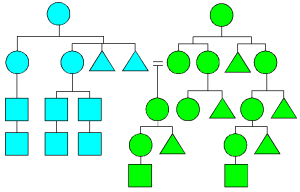![]()
![]()
![]()
![]()
![]()
![]()
![]()
mārjanen
one’s grandmother, mother’s mother, great-aunt, any female kin of one’s mother’s mother’s generation. The green circles are the purple square’s mārjanni:
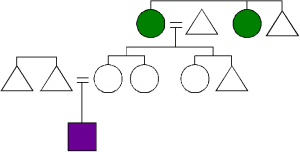
![]()
![]()
![]()
![]()
![]()
![]()
![]()
mārjanen
one’s grandmother, mother’s mother, great-aunt, any female kin of one’s mother’s mother’s generation. The green circles are the purple square’s mārjanni:

![]()
![]()
![]()
![]()
![]()
![]()
masōwa
one’s father. This can also include one’s father’s brothers, provided they all married into the clan. Since the Kēleni sometimes marry in sibling groups, this is not an uncommon occurrence. So, the green triangle’s are the purple square’s masōwi.
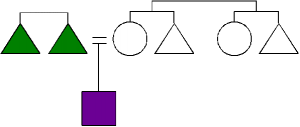
![]()
![]()
![]()
![]()
![]()
![]()
mawēsa
one’s maternal uncle, one’s mother’s brother, one’s male caregiver or parent, any of one’s mother’s male kin of the same generation. So, the green triangles are the purple square’s mawēsi:
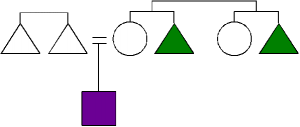
![]()
![]()
![]()
![]()
![]()
![]()
memāra
one’s biological mother. This is more of a technical term and is not in wide usage. In the picture below, the green circle is the purple square’s memāra.
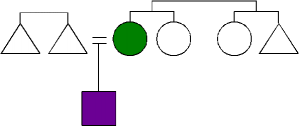
![]()
![]()
![]()
![]()
![]()
![]()
mapāra
one’s mother, aunt, foster-mother, one’s mother’s sister, any of one’s mother’s female relatives of the same generation. In the picture below, the purple square’s mapāri are designated by the green circles.

![]()
![]()
![]()
![]()
![]()
![]()
![]()
maxāntie
one’s lover, spouse, one’s special companion, perhaps a close sister or brother or lover, personally chosen kin of the same generation. One’s maxāntie does not necessarily start out as kin, though they can, but is otherwise considered to be one’s kin. They are not necessarily part of one’s clan, however, as that is governed by other rules.
![]()
![]()
![]()
![]()
makāe
one’s sister, brother, cousin, sibling or cousin of the opposite gender as oneself. [Plural makāji.]
So, if one is female (purple circle):
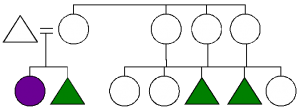
then all the green triangles are one’s makāji. Likewise, if one is male (purple triangle):

then all the green circles are one’s makāji.
![]()
![]()
![]()
![]()
matiē
one’s sister, brother, cousin, sibling or cousin of the same gender as oneself. [Plural matīji.]
So, if one is female (purple circle):
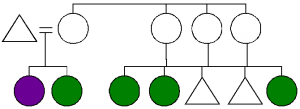
then all the green circles are one’s matīji. Likewise, if one is male (purple triangle):
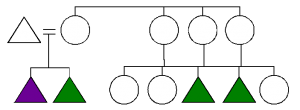
then all the green triangles are one’s matīji.
![]()
![]()
![]()
![]()
![]()
![]()
![]()
![]()
![]()
maþūskīri
The Kēleni see one’s kin as threads in a woven cloth. One’s makīri are the up and down threads (warp) and one’s maþūskīri are the side to side threads (weft). [See Wikipedia article on Weaving for more information on weaving.]
At it’s narrowest, maþūskīri means one’s father’s matrilineal kin. The meaning has expanded to include close friends, colleagues one interacts with every day, and other people one can reliably ask a favor of.
![]()
![]()
![]()
![]()
![]()
![]()
makīri
one’s kin, the people to whom one is related to by matrilineal descent. In the picture below, the two colors are two separate clans, and so two separate sets of makīri.
